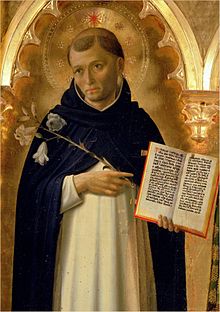Saint Dominic died in 1221, four years before his most famous spiritual son, Thomas of Aquinas was born, was, like the famed ‘Dumb Ox’, to fulfil much in a relatively short life: They both died at around the half-century mark, when some are just getting going. After all, Aristotle, whom Thomas did much to make a household name, claimed a man was not mature enough to study metaphysics until the tender age of 40, which was the age the Jews thought requisite to have developed a similar maturity to have a spiritual opinion; hence, their reply to the Christ, that He – yes, the Eternal One – was yet still but a relative youth in his early thirties.
But to God, all time, all ages, are relative, and from our human perspective, our main purpose is, by the grace of God, to save our souls, and help save those around us. Everything else, to paraphrase Einstein in a different context, is detail. Love the Lord thy God with all thy heart, soul, mind and strength, and thy neighbour as thyself.
The first and foremost way to love the other is to offer them the truth, which is a task to which Dominic dedicated his life, founding the ‘Order of Preachers’, Ordo Praedicatorum, whose primary task is to contemplate, study and hand on the fruits of this work to those who ‘know not the truth’. I heard somewhere that in their Rule, Dominicans are supposed to study four hours a day; I hope that is still true, both in theory and in practice, for God’s people still perish for lack of truth – now perhaps more than ever.
Dominic was more clear in his purpose and vision than his contemporary Francis, who was always ambivalent about beginning an Order. For how does one build an organization on the principles of a man whose principles were to own nothing? Hence, the persistent fissiparity of the followers of Francis; they would be the largest Order in the Church, if there not so many branches and types of them, all seeking to return to that ideal of their founder. Much to the good, and there have been countless saints, missionaries and martyrs amongst the Franciscans.
Yet, from the beginning, Dominic was clear that he wanted an Order of scholarly priests, firm and resolved in their work and purpose. Their first opponent – that for which they were originally founded in the early years of the 13th century – were the Cathars, then-modern-day Manicheans, who denied the goodness, even the ‘reality’, of creation, the body, marriage, sex, children – going so far as to call them evil, and that the best thing one could do was commit suicide, preferably by slow starvation – which sadly sounds a lot like some of the shrill modern environmentalists.
This rejection of God’s goodness really is at the root of all heresy, of the deep link that He made between heaven and earth, soul and body, written into the very nature of creation, and manifested most clearly in the Incarnation, in the Word taking our very flesh, the denial of which, as Saint John wrote, is the clearest message of Antichrist.
Dominic preached the goodness of good things by sacrificing many of them to God, going barefoot, abstaining from meat, an ascetical life and strict chastity, but always praising the Almighty for all He had given, as his son Thomas would do even more clearly and systematically.
So pray to Dominic and Thomas today for a return to that clarity of vision, the truth in all its depth and wonder.
Praise God, for we are fearfully and wonderfully made.


